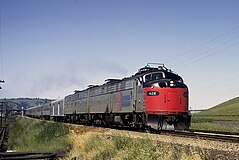List of Amtrak rolling stock
This article's images may require adjustment of image placement, formatting, and size. (November 2022) |
Amtrak operates a fleet of passenger train rolling stock consisting of predominantly custom-built equipment.[1] The active fleet includes some 240 diesel locomotives, 66 electric locomotives, 1,408 passenger cars and 20 Acela Express high-speed trainsets. Amtrak also operates 196 locomotives and railcars owned wholly by state partners.[2]
Current
Locomotives
Amtrak operates diesel, electric, and dual-mode (diesel or electric) locomotives. Its electric locomotives are confined to the Northeast Corridor and the Philadelphia to Harrisburg Main Line, dual-mode locomotives are only used in the Empire Corridor between Albany and New York, and the diesel locomotives are used in all other areas across in the United States.
| Builder | Model | Thumbnail | Road numbers | Active fleet | Year | Power type | Owner | |
|---|---|---|---|---|---|---|---|---|
| Road power | ||||||||
| GE | Dash 8-32BWH |  |
500–519 | 11 | 1991 | Diesel | Amtrak | |
| Genesis P40DC |  |
800–843 | 13 | 1993 | ||||
| Genesis P42DC | 1–207 | 174 | 1996–2001 | |||||
| Genesis P32AC-DM | 700–717 | 18 | 1995 | Dual-mode | ||||
| Siemens | Sprinter ACS-64 |  |
600–665, 667–670 | 66 | 2014 | Electric | ||
| Charger ALC-42 |  |
300–424 | 29 (125) | 2021 | Diesel | |||
| State-owned road power | ||||||||
| GE | Dash 8-32BWH |  |
2051, 2052 | 2 | 1991 | Diesel | Caltrans | |
| EMD | F59PH |  |
1810, 1859, 1869, 1893 | 4 | 1988 | NCDOT | ||
| 1871, 1984 | 2 | 1990 | ||||||
| F59PHI |  |
1755, 1797 | 2 | 1998 | ||||
| 2001–2009 | 9 | 1994 | Caltrans | |||||
| 2010–2015 | 6 | 2001 | ||||||
| Siemens | Charger SC-44 |  |
1400–1401, 1403–1408 | 8 | 2016 | WSDOT | ||
| 2101–2124 | 24 | Caltrans | ||||||
| 4601–4633 | 33 | IDOT | ||||||
| Non-Revenue/Switcher Locomotives | ||||||||
| EMD | SW1 |  |
737 | 1 | 1941 | Diesel | Amtrak | |
| GE | GE 80-ton switcher | 1000 | 1 | 1951 | ||||
| 1100 | 1 | 1952 | ||||||
| EMD | SW1000R |  |
790–799 | 4 | 1952 | |||
| EMD | GP38H-3 | 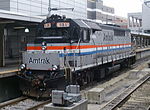 |
520–527 | 8 | 1966-1968[a] | |||
| EMD | MP15 |  |
530–539 | 10 | 1970 | |||
| EMD | SW1500 | 540, 541 | 2 | 1970 | ||||
| EMD | SW1001 | 569 | 1 | 1974 | ||||
| EMD | GP38-3 |  |
720–724 | 5 | 1976 | |||
| 725–734 | 10 | 1960s-70s[b] | ||||||
| MPI | GP15D | 570–579 | 10 | 2004 | ||||
| MP14B |  |
590 | 1 | 2010 | Diesel Genset | |||
| MP21B | 591 | 1 | ||||||
| MP14B | 592, 593 | 2 | 2013 | |||||
| National Railway Equipment | 2GS12B |  |
597, 599 | 2 | 2014 | |||
| 792, 793 | 2 | 2018 | ||||||
| Sources:[2][7][8][9][10] | ||||||||
Passenger cars
As of late 2018, Amtrak rostered 1,408 passenger cars of various types. These include coaches, lounges, dining cars, sleeping cars, baggage cars and crew/dormitory cars.[2]: 48–51
| Builder | Model | Thumbnail | Road Numbers | In service | Year built | Owner |
|---|---|---|---|---|---|---|
| Budd Company | Metroliner cab car |  |
9632–9651 | 16 | 1967–1970[c] | Amtrak |
| Amfleet I | 43346–48196, 81500–82999 | 435 | 1975 | |||
| Amfleet II | 25000–28024 | 134 | 1981 | |||
| Pullman Standard | Superliner I |  |
31000–38034 | 227 | 1979 | |
| Bombardier | Superliner II | 32070–39046 | 163 | 1993 | ||
| Bombardier | Horizon |  |
53501–58108 | 92 | 1988 | |
| Budd Company | Viewliner (prototype) | 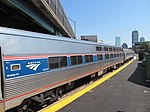 |
2300–2301; 8400 | 1 | 1987 | |
| Morrison-Knudsen | Viewliner I | 62000–62049 | 38 | 1995 | ||
| CAF | Viewliner II | 61000–69009 | 117 | 2015 | ||
| Alstom | Surfliner |  |
6300–6908 | 39 | 2000 | |
| EMD | Non-Powered Control Unit | 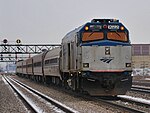 |
406, 90200–90413 | 19 | 1977–1981[d] | |
| Johnstown America | Autorack |  |
9200–9279 | 77 | 2005 | |
| State-owned cars | ||||||
| Morrison-Knudsen | California Car |  |
8001–8814 | 66 | 1996 | Caltrans |
| Alstom | Surfliner |  |
6351–6965 | 10 | 2002 | |
| St Louis Car Company | Comet IB |  |
5001–5014 | 14 | 1968[e] | |
| North Carolina Fleet |  |
400001–400205 | 20 | 1952–1965 | NCDOT | |
| EMD | Non-Powered Control Unit |  |
90252–90253, 90340 | 2 | 1977, 1980[f] | ODOT |
| 101–105 | 5 | 1988–1990[g] | NCDOT | |||
| Siemens Mobility | Venture |  |
4001–4020,[h] 4101–4134,[i] 4201–4217,[j] 4301–4317[k][16] | 44 (97) | 2022 | IDOT |
Trainsets
| Builder | Model | Thumbnail | Road numbers | In service | Year introduced | Notes |
|---|---|---|---|---|---|---|
| Bombardier/Alstom | Acela Express |  |
2000–2039 | 40 | 1999 | Electric locomotive; each one is semi-permanently coupled to each end of a trainset. |
 |
3200–3559 | 120 | Unpowered trailer cars; six (four business class, one first class and one cafe) per trainset. 20 trainsets in total. | |||
| Talgo | Series 8 |  |
7110–7911 | 33 | 2013 | 2 trainsets used on Amtrak Cascades, owned by the Oregon Department of Transportation. Unpowered; 13 cars per trainset. |
| Alstom | Avelia Liberty | 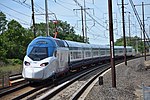 |
2100–2155 | 0 (56) | (2023) | Not yet in service. 56 electric locomotives on order.[17][18][19] |
| 3250–3927 | 0 (252) | Not yet in service. 28 nine-car unpowered trainsets. | ||||
| Siemens Mobility | Venture |  |
0 (49) | (2023) | Not yet in service. 7 seven-car unpowered trainsets for San Joaquins. Trainset will include a cab car. Owned by Caltrans. | |
| 0 (48) | (2026) | Not yet in service. 8 six-car unpowered trainsets for Amtrak Cascades. Trainset will include a cab car. | ||||
| Airo (Charger ALC-42E) | 0 (75) | Not yet in service. Diesel-electric locomotive. Motors can be powered by energy generated by diesel engine, drawn from overhead lines by Airo power car, or by charge in Airo battery car. | ||||
| Airo (Venture) | 0 (156) | Not yet in service. 26 six-car trainsets for Carolinian, Downeaster, Keystone Service, Palmetto, Pennsylvanian and Vermonter. Trainset will include cab car and power car, which will draw power from overhead lines and feed to motors. | ||||
| 0 (256) | Not yet in service. 32 eight-car trainsets for Northeast Regional. Trainset will include cab car and power car, which will draw power from overhead lines and feed to motors. | |||||
| 0 (102) | Not yet in service. 17 six-car trainsets for Adirondack, Empire Service, Ethan Allen Express and Maple Leaf. Trainset will include a cab car and a battery car that will supply electricity to the motors. | |||||
| Stadler | FLIRT | 0 (4 sets) | (2027) | Not yet in service. Hydrogen multiple units for use on the San Joaquins.[20][21] |
Business cars
-
Three of Amtrak's business cars on the back of the Blue Water in 2011: the Pacific Cape, Ocean View, and Beech Grove.
-
Amtrak's American View business and inspection car
In addition to its regular fleet, Amtrak owns several business and track geometry cars:[22][16]
- #10001 Beech Grove, an "Amfleet office car"[23] used for official business by the Amtrak president and other VIPs. This unique car has an open observation platform, lounge seating area, dining room, kitchen and 2 sleeping accommodations, as well as lights, GPS equipment and a camera to inspect tracks for defects. The car was repurposed in 2020 with a LiDAR Laser Measurement System.
- #10002 Corridor Clipper, an Amfleet I-based track geometry car. It is periodically attached to the end of a diesel or electric revenue-running train or is hauled by a locomotive only. The car previously had a special pantograph that was used to test and measure overhead lines.
- #10003, an unnamed Acela-based track geometry car. It is periodically inserted into an Acela Express consist between a power car (locomotive) and the nearest end car, resulting in a train with two power cars and seven intermediate cars rather than the normal six.[24]
- #10004 American View, a Viewliner-based "inspection car"[25] with rear-facing seats and large glass window at the end of the car that allows passengers to observe the tracks. The car can also be used by maintenance crews to visually inspect the tracks for defects and by the Amtrak president and other executives for official purposes. Originally numbered #2301, the American View is one of the three prototype Viewliner cars and was the last passenger railcar produced by Budd.
- #10005, an unnamed catenary measurement car. Like car #10002 Corridor Clipper, this car has a special pantograph that is used to test and measure overhead lines.
- #10020 Pacific Bend, a heritage Pacific-series 10-6 sleeper formally used by Union Pacific, now converted for crew use on special trains. Four roomettes remain for staff use, five roomettes have been converted to storage areas and one has been converted into a shower. The bedrooms have been removed and replaced with a crew lounge.
- #10021 Pacific Cape, a heritage Pacific-series 10-6 sleeper now converted for crew use on special trains. It is usually used along with the Beech Grove for official business by the Amtrak president and other VIPs.
- #9800 Metroliner, a former Metroliner electric multiple unit cafe converted to be used as a first-class conference car. Primarily used on charter services on the Northeast Corridor. The car is broken up into 3 areas, one end of the car has 12 business class seats in a 2+1 configuration, the middle has a cafe, and the other end has conference areas (a large private conference room with 8 seats around a large table, 2 medium-sized semi-private conference sections with 4 seats around a table and 2 small semi-private conference sections with 2 seats around a table).[26] The car at one time had cab controls that have since been removed
Former (Amtrak purchased)
This is a partial listing of locomotives and rolling stock formerly operated by Amtrak. This does not include equipment inherited from private railroads (see #Inherited)
Locomotives
| Builder | Model | Thumbnail | Road numbers | Years of service | Power type |
|---|---|---|---|---|---|
| Road power | |||||
| EMD | SDP40F |  |
500–649 | 1973–1987 | Diesel |
| GE | P30CH |  |
700–724 | 1975–1991 | Diesel |
| EMD | F40PH |  |
200–229, 410–415 | 1976–2003 | Diesel |
| EMD | F40PHR |  |
230–409 | 1977–2003 | Diesel |
| EMD/Siemens | F69PHAC | 450–451 | 1989–1993 | Diesel | |
| GE | E60 |  |
950–975 | 1974–2003 | Electric |
| Bombardier/Alstom | HHP-8 |  |
650–664 | 1999–2014 | Electric |
| EMD/ASEA | AEM-7 |  |
900–953 | 1978–2016 | Electric |
| EMD | EMD F59PHI |  |
450–470 | 1998–2019 | Diesel |
| Switchers | |||||
| ALCO | RS-1 | 44, 46, 47, 59, 62 | Diesel | ||
| ALCO | RS-3 |  |
100–144 | Diesel | |
| ALCO | S-2 | 746 | Diesel | ||
| EMD | SW1 |  |
730–745 | 1976 | Diesel |
| EMD | SSB1200 | 550–567 | 1984–2008 | Diesel | |
| EMD | CF7 | 575–599 | 1984–2003 | Diesel | |
| EMD | GP7 |  |
760–762, 769, 771–784 | Diesel | |
| EMD | GP9 | 763–768, 770 | Diesel | ||
| EMD | GP40 | 650–664 | 1991–1993 | Diesel | |
| EMD | SW8 |  |
1, 3, 747–750 | Diesel | |
| GE | 45t | 7 | Diesel | ||
| GE | 65t | 5, 6 | Diesel | ||
| Railpower | GG20B | 599 | 2006–2008 | Diesel | |
Trainsets
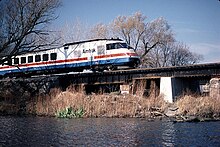
| Builder | Model | Road numbers | Years of service | Power type | Notes |
|---|---|---|---|---|---|
| ANF | Turboliner | 58–69 | 1973–1995 | Gas turbine | Semi-permanently coupled trainset. |
| Rohr | Turboliner | 150–163 | 1976–2002 | Gas turbine | Semi-permanently coupled trainset. |
| Bombardier | LRC | 38, 39 (power cars) |
1980–1982 | Diesel | Leased by Amtrak, returned to Bombardier.[27] |
| Talgo | Series VI | 7100–7905 (52 cars) | 1998–2020 | Unpowered (locomotive-hauled) | Five 13-car trainsets for Amtrak Cascades, Two trainsets (Mt. Hood and Mt. Olympus) owned by Amtrak, three (Mt. Adams, Mt. Baker and Mt. Rainier) owned by WSDOT. Mt. Adams trainset destroyed in 2017 Washington train derailment, others retired on recommendation of the NTSB.[28][29] |
Express cars
Amtrak has fielded four different types of specialized cars to support its mail and express business. These included material handling cars (MHCs), roadrailers, express boxcars, and ExpressTrak refrigerator cars. Although express cars are traditionally called "head end" cars; the MHC express boxcars were the only cars equipped with lines for head end power, allowing them to be located between the locomotive and passenger cars. All others were found on the rear of the train, behind the last passenger car. Most of the fleet was retired in 2003 when Amtrak exited the express business, save for parcels carried in baggage cars.[30]
Former (inherited)
Locomotives
-
EMD E9 "A" and "B" units with the San Joaquin in 1974.
-
EMD FP7 leading the San Francisco Zephyr in 1975.
-
Amtrak GG1 #904 westbound at Harrison, New Jersey in June 1975
-
EMD FL9 #486 at the Grand Central Terminal in 1991.
-
EMD E8A #315 leading the Illinois Zephyr in 1975.
Amtrak inherited numerous locomotives from private railroads on its formation in 1971. Most of these were retired by the end of the decade, if not earlier. These locomotives are enumerated below, with their original owners.[31]
| Builder | Model | Road numbers | Years of service | Notes |
|---|---|---|---|---|
| EMD | F3A | Ex-BN, NP | ||
| EMD | F3B | 155–156 | 1971–1975 | Ex-BN, NP |
| 660–665 | Ex-BN | |||
| EMD | F7A | 100–107 | 1971–c. 1977 | Ex-BN, NP |
| EMD | F7B | 150–151 | 1971–c. 1977 | Ex-BN, GN |
| 152–154 | Ex-BN, NP | |||
| 160–164 | Ex-SP | |||
| EMD | FP7A | 110–123 | 1971–c. 1975 | Ex-SP |
| EMD | E8A | 200–210 | 1971–c. 1979 | Ex-BO |
| 211–212 | Ex-BO, CO | |||
| 213–223 | Ex-RFP | |||
| 224–225 | Ex-LN | |||
| 226–227 | Ex-LN, SLSF | |||
| 230–231 | Ex-SCL, FWD | |||
| 232–237 | Ex-SCL, ACL | |||
| 238–245 | Ex-SCL, ACL, MKT | |||
| 246–254 | Ex-SCL, SAL | |||
| 255–276 | Ex-PC, NYC, PRR | |||
| 277–324 | Ex-PC, PCC | |||
| 325–331 | Ex-UP | |||
| 332–352 | Ex-BN, CBQ | |||
| 436 | Ex-IC | |||
| EMD | E8B | 370–374 | 1971–c. 1979 | Ex-UP |
| EMD | E9A | 400–403 | 1971–1980 | Ex-BO |
| 404 | Ex-SCL, SAL | |||
| 405–410, 434–435 | Ex-MILW | |||
| 411–433 | Ex-UP | |||
| EMD | E9B | 446, 453–470 | 1971–1980 | Ex-UP |
| 450–452, 471–472 | Ex-MILW | |||
| EMD | FL9 | 231–242 | 1971–c. 1996 | Dual-mode. Ex-PC, CR, NH |
| GE | E44 | 1971–mid 1980s | Ex-PC, PRR | |
| GE | GG1 | 900-929 | 1971–1980 | Ex-PC, PRR |
Trainsets and multiple units
-
Budd RDC #15 on a Black Hawk service in 1975.
-
Budd Metroliner cab car #880 leading a Metroliner service in 1980.
| Builder | Model | Road numbers | Original owner | Years of service | Notes |
|---|---|---|---|---|---|
| UAC | TurboTrain | 50–53 | USDOT via NYC, PC | 1971-1976 | Gas turbine trainset. |
| Budd | RDC | 10–20, 27–29, 36 | NH via PC | Diesel multiple unit | |
| 30–32, 40–42 | Ex-BN, NP | ||||
| 34 | Ex-PC, NYC | ||||
| 43 | Ex-BN, GN | ||||
| Budd | Metroliner | 800–830, 850–869, 880–889 | PC | 1971-1988 | Electric multiple unit. 860 preserved. Many remain active as de-motored cab cars. |
Passenger cars

| Builder | Model | Road numbers | Years of service |
|---|---|---|---|
| Various | Baggage cars | 1000 series | 1971–2017 |
| Budd Company / American Car & Foundry Pullman Standard / St Louis Car Company |
Sleeping cars | 2000 series | 1971–2007 |
| Lounge cars | 3000 series | 1971–2000 | |
| Coach cars | 4000–7000 series | 1971–2002 | |
| Dining cars | 8000 series | 1971–2017 | |
| Budd Company / American Car & Foundry Pullman Standard |
Dome cars | 9000 series | 1971–2019 |
| Budd Company | Hi-Level cars | 9000 series 39000 series |
1971–2018 |
See also
- Amtrak paint schemes
- Budd SPV-2000, Connecticut-owned diesel multiple units which Amtrak operated in the 1980s–1990s
Notes
- ^ Originally built as GMD GP40TC locomotives for GO Transit.[3] They were acquired by Amtrak in 1988,[4] and rebuilt to GP38H-3 locomotives in 2005 by the Altoona Works[5]
- ^ Upgraded to GP38-3 standards by Progress Rail 2022-2023[6]
- ^ Originally built as Budd Metroliner electric multiple units; converted to control cars from 1987 to 1988
- ^ Originally built as EMD F40PH locomotives; converted into Non-Powered Control Units (NPCUs) from 1996 to 2007,[11] except for Amtrak 406, which was converted in 2011[12]
- ^ Originally built for Penn Central Transportation Company and NJDOT as Arrow I electric multiple units. They were converted to Comet IB locomotive-hauled coaches by Morrison–Knudsen from 1987 to 1988, for use by NJ Transit Rail Operations.[13] These cars were purchased by Caltrans in 2008,[14] and after a second rebuild, entered service on the San Joaquins in 2013.[15]
- ^ Originally built for Amtrak as EMD F40PH locomotives; converted to Non-Powered Control Units (NPCUs) in the late-1990s and early-2000s. They were purchased by the Oregon Department of Transportation in 2009, and leased to Amtrak for use on the Amtrak Cascades.[16]
- ^ Originally built for GO Transit rail services as EMD F59PH locomotives; now owned by the North Carolina Department of Transportation, they were converted to Cab Control Units (CCU) in 2019 for use on the Piedmont.[16]
- ^ Single coaches with a traditional gangway at each end. All 20 coaches are in service.[16]
- ^ Married pairs, with a coach attached to a cafe car or a business class car. 34 units delivered, with 25 in service.[16]
- ^ Married pairs, with a coach attached to a combined coach/business class car. 14 units delivered, with 9 in service.[16]
- ^ Married pairs, with a coach attached to a lounge/cafe car. 1 unit delivered, but not yet in service.[16]
References
- ^ Lettenberger, Bob (June 5, 2023). "Five mind-blowing facts — Amtrak equipment". Trains Newsletter. Kalmbach. Retrieved June 6, 2023.
- ^ a b c "Amtrak Five Year Equipment Asset Line Plan" (PDF). Amtrak. January 18, 2019. Retrieved May 14, 2020.
- ^ Wilson, Jeff (2009). The Model Railroader's Guide to Diesel Locomotives. Kalmbach Publishing. p. 55.
- ^ Solomon, Brian (2004). Amtrak. St. Paul, MN: Voyageur Press. p. 106. ISBN 978-0-7603-1765-5.
- ^ "Amtrak Motive Power Roster". On Track On Line. Retrieved October 15, 2023.
- ^ "AMTRAK BY THE NUMBERS". On Track On Line. Retrieved October 15, 2023.
- ^ "Motive Power Roster". On Track On Line. November 1, 2018. Retrieved November 6, 2018.
- ^ Sutton, Harry; Warner, David. "On Track On Line - Amtrak Motive Power Roster". on-track-on-line.com. Retrieved September 28, 2018.
- ^ "Amtrak By the Numbers: Updates". On Track On Line. May 1, 2020. Retrieved May 15, 2020.
- ^ https://www.amtrak.com/content/dam/projects/dotcom/english/public/documents/corporate/businessplanning/Amtrak-Service-Asset-Line-Plans-FY22-27.pdf
- ^ Simon & Warner 2011, p. 42
- ^ "Exhibit Train Equipment History". Amtrak. Retrieved August 6, 2016.
- ^ Rosenbaum, Joel (1996). NJ Transit Rail Operations. Railpace. ISBN 0962154164.
- ^ San Joaquin Joint Powers Authority/Caltrans. "San Joaquin Rolling Stock Presentation" (PDF). pp. 35–42. Archived from the original (PDF) on November 5, 2013. Retrieved June 30, 2013.
- ^ "San Joaquin Trains 711 and 718: Operate with Refurbished Equipment" (Press release). Amtrak. Archived from the original on October 24, 2013. Retrieved October 22, 2013.
- ^ a b c d e f g h Warner, David (November 1, 2018). "On Track On Line - Amtrak Passenger Equipment Roster - Rolling Stock". on-track-on-line.com. Retrieved December 18, 2018.
- ^ "Amtrak selects Alstom for Northeast Corridor train contract". Railway Gazette International. September 23, 2015. Retrieved September 23, 2015.
- ^ "Amtrak orders Alstom trains for Northeast Corridor". International Railway Journal. August 26, 2016.
- ^ "The Next generation of Amtrak High Speed trains". Amtrak. August 26, 2016. Retrieved August 26, 2016.
- ^ Fender, Keith (September 21, 2022). "California orders 29 hydrogen trains for inter-city services". International Railway Journal. Retrieved September 30, 2022.
- ^ "California Orders 29 HFC Trains for Intercity Services (UPDATED)". Railway Age. September 27, 2022. Retrieved September 30, 2022.
- ^ Simon & Warner (2011).
- ^ "AMTK 10001". Archived from the original on February 18, 2015. Retrieved April 11, 2014.
- ^ "AMTK10003: Acela Inspection Car". Archived from the original on December 4, 2002. Retrieved September 10, 2010.
- ^ "American View (AMTK 10004)". Retrieved April 11, 2014.
- ^ "Search Results – 9800". Railpictures.net. Retrieved April 11, 2014.
- ^ Simon & Warner (2011), p. 99.
- ^ Lindblom, Mike (May 22, 2019). "WSDOT to replace its Talgo railcars like those in the 2017 Amtrak crash near DuPont 'as soon as possible'". Retrieved July 7, 2020.
- ^ Warner, David (July 1, 2020). "On Track On Line - Amtrak Trainset Roster". on-track-on-line.com. Retrieved July 7, 2020.
- ^ Simon & Warner (2011), p. 238.
- ^ "All-Time Amtrak Diesel Locomotive Roster as of 8-29-90". August 29, 1990. Retrieved November 19, 2011.
- Simon, Elbert; Warner, David C. (2011). Holland, Kevin J. (ed.). Amtrak by the Numbers: A Comprehensive Passenger Car and Motive Power Roster – 1971–2011. Kansas City, Missouri: White River Productions. ISBN 978-1-932804-12-6.




